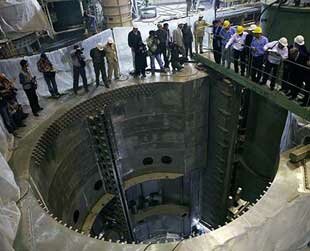Hawks in Washington and elsewhere may have viewed Thursday's talks with Iran as a mere formality, a box to be checked along the way to harsher sanctions or military action to stop the country's nuclear program. Tehran plainly had other ideas.
The Iranians' flexibility and the concrete proposals to which they agreed at the Geneva meeting will, if implemented, at least for the moment largely neutralize efforts to muster new sanctions, much less military action against Tehran — and all without necessarily changing the fundamentals of Iran's nuclear output.
The Obama Administration last week sought to turn up the heat on the issue by issuing an ultimatum over Iran's newly disclosed enrichment facility at Qom: Submit the site to full inspection by the International Atomic Energy Agency (IAEA), or else face an immediate push for new sanctions. But, if anything, that demand simply teed up what can be viewed as a diplomatic win-win situation: Having disclosed the site's existence to the IAEA a few days before President Obama's dramatic press conference in Pittsburgh, Tehran was clearly intending to submit to inspections there — it does, after all, claim to be operating within the rules set by the international nuclear watchdog. It was easy, then, for Iran to agree to inspections that amount to standard IAEA practice, and for Western diplomats at the same time to portray Tehran's agreement to inspections as a response to pressure. Indeed, President Obama's warning after the talks that Iran must admit inspectors "within two weeks" seemed like an attempt to neutralize the expected criticism over a perceived easing of pressure on Iran.
The even more significant news from Geneva was Iran's agreement, in principle, to a proposal under which it would ship most of its current stockpile of low-enriched uranium to Russia for further enrichment, and then to France to be turned into fuel rods to power a Tehran reactor used for medical research. The details are to be negotiated under IAEA auspices in Vienna on October 18, but if the scheme is implemented, it would be a major confidence-building measure: Iran's current stockpile of low-enriched uranium (LEU) has been cited as Exhibit A in dire warnings that it is drawing perilously close to bomb-making capability, on the grounds that if further enriched, that stockpile could already provide enough materiel for a single bomb. But the deal hammered out at Geneva would turn three quarters of it from its current gas form into solid fuel rods, which are extremely difficult to turn into weapons-grade material.
"The potential advantage of [the deal to turn Iranian uranium into reactor fuel in Russia and France], if it's implemented, is that it would significantly reduce Iran's LEU stockpile, which itself is a source of anxiety in the Middle East and elsewhere," said a senior U.S. official at the talks who requested anonymity. That, he added, "would be a positive interim step to help build confidence so that we'd have more diplomatic space to pursue Iran's compliance with its obligations."
But while Administration and European officials presented Iran's moves as a response to mounting pressure from the West, Iran analyst Trita Parsi, president of the National Iranian American Council, says they're missing the point: "For Tehran, this agreement to reprocess LEU that it created in defiance of the Western insistence that Iran cannot be allowed to enrich uranium represents a tacit acceptance of enrichment in Iran," says Parsi. "The Iranians will view this as an important change in the U.S. position on enrichment, focusing instead on transforming the LEU into fuel rods in order to remove doubts about what Iran intends to do with the material being enriched in its centrifuges."
Until now the U.S. position, strongly backed by France and Israel, has been that Iran should not be allowed to maintain a uranium-enrichment capability even for peaceful purposes, because such a capability could be transformed to create bomb material. President Bush even spoke of preventing Iran from attaining the "know-how" to enrich uranium. Earlier this year, Secretary of State Hillary Clinton insisted that Iran did not have the right to the full nuclear fuel cycle, which is available to all signatories to the NPT (which includes Iran). The Iranians flatly reject the demand that they forego the right to enrichment for energy purposes, insisting that their nuclear "rights" are not up for negotiation.
But many in Washington and beyond have argued that the goal of preventing Iran from enriching uranium is no longer attainable, and that the international community's focus should be on strengthening safeguards against weaponization of nuclear material there. To the extent that non-proliferation, rather than reversing Iran's uranium enrichment program, is the goal, implementation of the agreements reached in Geneva would be a big win for the West.
If Iran had been hell-bent on turning its stockpiles of LEU into a bomb, as many hawks have claimed, the latest agreements amount to a significant setback. But if Iran's goal had, as some analysts have long suggested, been simply to acquire "breakout" capacity through an above-board civilian nuclear energy program — that is, the ability to repurpose its nuclear energy to build a bomb relatively quickly if, at some point in the future, it chose to opt out of the Nonproliferation Treaty — it may be more important to win acceptance of uranium enrichment, under international monitoring, on Iranian soil.
Of course, the diplomatic process is only just beginning, and the two sides may have very different end points in mind. But right now, they're making progress on the issue where progress seems most possible: strengthening safeguards against Iran weaponizing nuclear material, rather than preventing it from creating that nuclear material in the first place.
Source: Time Magazine
October, 03, 09
MSN - - - Wikipedia - Hamsayeh.Net



